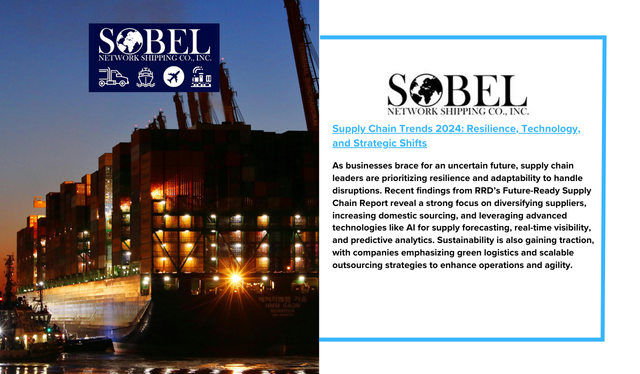As businesses brace for an uncertain future, supply chain leaders are prioritizing resilience and adaptability to handle disruptions. Recent findings from RRD’s Future-Ready Supply Chain Report reveal a strong focus on diversifying suppliers, increasing domestic sourcing, and leveraging advanced technologies like AI for supply forecasting, real-time visibility, and predictive analytics. Sustainability is also gaining traction, with companies emphasizing green logistics and scalable outsourcing strategies to enhance operations and agility.
Inflation continues to shape holiday strategies for both retailers and consumers, with high costs dominating concerns. According to Manhattan Associates’ Supply Chain Confidence Survey, 85% of consumers are worried about rising prices, prompting 64% to cut non-essential spending and prioritize discounts. Retailers are responding with AI-driven inventory management, flexible payment options, and workforce expansions to meet omnichannel demand efficiently. Promotions and loyalty programs are also being ramped up to maintain consumer interest while controlling operating costs.
Intermodal rail, which faced challenges earlier this year, is rebounding with a 9.8% increase in volume year-over-year for Q3 2024, driven largely by a 15.4% rise in international container traffic. The Port of Baltimore’s newly launched double-stacked rail operations further enhance intermodal efficiency, with projections of 160,000 additional containers annually and 13,000 new jobs. These developments are set to bolster supply chain connectivity and reduce costs, particularly in Northeast and Midwest markets.
Meanwhile, geopolitical and economic uncertainties are accelerating the trend toward nearshoring. According to a KPMG report, 73% of executives report improved efficiency by concentrating supply chain operations within the Americas, with a projected 16% increase in U.S.-focused supply chains. This shift reflects a broader focus on speed, resilience, and sustainability over cost savings as businesses navigate an increasingly complex global market.
Holiday-driven returns are another major challenge, as retailers grapple with rising fraud rates and operational costs. AI is playing a pivotal role in reverse logistics, helping minimize returns through enhanced product descriptions and sizing accuracy. With returns fraud costing retailers $101 billion in 2023, preventative measures and advanced analytics are becoming essential to mitigate losses during peak seasons.
Supply chain management is now a top priority for CEOs, with 96% dedicating equal or more time to these issues, according to Proxima’s Supply Chain Barometer. Sectors like tech, healthcare, and construction are leading this trend, reflecting the growing complexity and importance of supply chains in achieving business resilience and growth.
From leveraging technology and sustainability to managing inflationary pressures and improving logistics efficiency, supply chains are evolving rapidly to meet the challenges of 2024. As businesses continue to adapt, those that invest in strategic agility and innovative solutions will be best positioned to thrive in this dynamic landscape.


